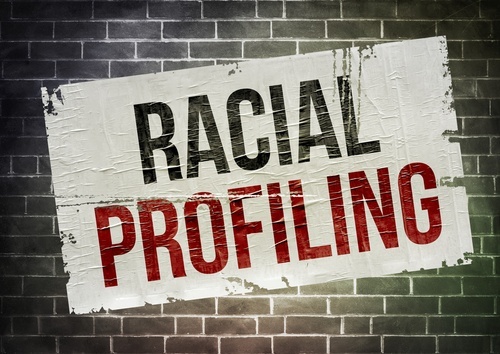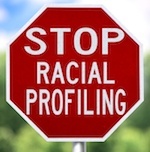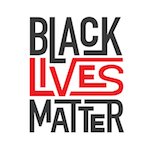Nevada and federal law prohibit police from detaining, arresting or harassing people based solely on their
- race,
- ethnicity, or
- national origin.
Victims of racial profiling may be able to recover substantial compensatory damages through Section 1983 lawsuits in Nevada.
If the officers acted maliciously, victims may also be able to recover punitive damages, which are often higher than compensatory damages. And depending on the case, racial profiling victims may bring other causes of action as well including battery and false imprisonment in Nevada.
In this article, our Nevada personal injury attorneys discuss:
- 1. Police profiling based on race in Nevada
- 2. Laws prohibiting police profiling based on race
- 3. Lawsuits and remedies
- 4. Defendants in racial profiling lawsuits
- 5. Qualified immunity for police
- 6. Statute of limitations

1. Police profiling based on race in Nevada
Racial profiling is a fact in Nevada. A study ordered by the State Legislature found that African-Americans and Hispanics are more likely to be pulled over for traffic stops than Caucasians. Furthermore, black and brown people are handcuffed and arrested at a disproportionately higher percentage than whites.1 And according to a recent Department of Justice initiative, black men in Clark County are four times more likely to be arrested for drug possession than white men.2
The definition of racial profiling is targeting people based on their race, ethnicity or nationality. Law enforcement officers who engage in racial profiling presume that a particular person has a higher chance of committing a crime solely due to skin color or ethnicity.
Racial profiling occurs in such law enforcement contexts as:
- traffic stops
- Terry stops (stop-and-frisk)
- car searches
- arrests
- immigration enforcement
- jail and prison treatment
- anti-terrorism efforts

Note that racial profiling can extend to any minority, including Asians and Muslims.
Even if racial profiling victims ultimately get cleared of suspicion, they have still been injured: The unlawful detentions, arrests, and searches they were subjected to cost them time, maybe money, and personal dignity.
2. Laws prohibiting police profiling based on race
Racial profiling is illegal under both Nevada state law and the U.S. Constitution:
2.1. Nevada law
NRS 289.820 prohibits law enforcement from considering a person’s race, ethnicity or national origin when initiating a police action unless those factors are part of an identifying description of a specific suspect for a specific crime.3 Criminal defense attorney Michael Becker illustrates this “specific suspect exception”:
Example: Jenny witnesses a robbery at a Henderson 7-11. She gives a description of the suspect to the police, which includes that he was a tall Arab male in his mid-thirties. In this situation, the police are allowed to target suspects matching this description because ethnicity is merely being used as a descriptor. But if Jenny did not know the suspect’s ethnicity because the suspect was wearing a mask, then the police would not be allowed to target Arabic suspects over suspects of other races.
It makes no difference if all the past robberies in that neighborhood in the above example happened to have been carried out by Arabic people. If a suspect’s race or ethnicity is unknown, police cannot target suspects based solely on race or ethnicity.
2.2. Federal law

Racial profiling violates people’s Fourth Amendment protection from unreasonable searches and seizures as well as their Fourteenth Amendment’s right to equal protection of the law:4
In order for police to conduct a stop-and-frisk (“Terry stop”), the police need “reasonable suspicion” that the suspect committed a crime. And in order for police to conduct an arrest or a search, the police need “probable cause” to believe the suspects committed a crime (this is a higher standard than reasonable suspicion)…
When formulating reasonable suspicion or probable cause, police may not let any racial animus or discriminatory intent factor into their decisions. Police may consider such contextual factors as an area’s crime rate or if the suspect is behaving suspiciously. But unless the police already know that a suspect they are looking for is of a particular race or ethnicity, the police violate the U.S. Constitution by targeting someone based on race or ethnicity.5
3. Lawsuits and remedies
People who have been targeted by law enforcement based on race, ethnicity, or national origin can sue the police under 42 U.S.C. Section 1983. Their primary allegation would be that the racial profiling violated their Fourth Amendment rights against unreasonable searches and seizures.6
Plaintiffs who win these cases can collect compensatory damages to pay for their:
- medical bills
- pain and suffering,
- lost wages, and/or
- loss of future earnings
If law enforcement officers behaved in a malicious way, plaintiffs may be able to collect punitive damages as well. And courts can also require that the defendants pay the plaintiffs’ attorneys’ fees.7
Note that people who were unlawfully detained and/or arrested by police may also be able to sue police for false imprisonment and/or false arrest as well. Learn more about suing for false imprisonment.
4. Defendants in racial profiling lawsuits

Depending on the case, racial profiling victims may be able to bring a Section 1983 suit against:
- the police officer(s) or sheriff’s deputy in the matter,
- the police chief or sheriff,
- the police department or sheriff’s office, and/or
- the city or county
A personal injury attorney will always try to hold the police department responsible in addition to the individual officers who discriminated against the plaintiff. This is because there is a higher likelihood that the police department can afford to pay out a larger settlement than the officers can.
5. Qualified immunity for police
The primary defense police raise when sued under Section 1983 is that their “qualified immunity” as government officials shields them from liability. However, plaintiffs may be able to “pierce” this immunity by showing that the officers’ actions were unreasonable and not within the bounds of good faith.8
Therefore, a plaintiff’s attorney would try to compile evidence that shows that the police acted in bad faith by practicing racial profiling. Common evidence in these cases are:
- eyewitnesses that observed the officers targeting suspects based on race,
- video of the officers engaging in racial profiling, and/or
- police records that show that the officers were never given a description of a suspect that mentioned race
In short, “qualified immunity” protects police officers from lawsuits when they are doing their job. Targeting suspects based on race is not part of their job. And if the plaintiff can show that the officer acted unreasonably, the officer may lose immunity.
6. Statute of limitations
In most Section 1983 cases, plaintiffs have two years after the incident to file suit. Every case is different, however, so plaintiffs should consult with a personal injury attorney to calculate the time limit and discuss other lawsuit options.9

Learn more about suing for police misconduct in Nevada.
Discriminated against in California? See our article about racial profiling by police in California.
Legal References:
- Blacks, Hispanics in Nevada more likely to be pulled over for traffic stops, Las Vegas Sun (January 31, 2003).
- Sandy Lopez, Michael Brown death spurs local forums on racial profiling, Las Vegas Review-Journal (September 23, 2014)
- NRS 289.820 Peace officer prohibited from engaging in racial profiling; retaliatory or punitive action prohibited against peace officer for disclosure of information concerning racial profiling.
1. A peace officer shall not engage in racial profiling.
2. No retaliatory or punitive action may be taken against a peace officer who discloses information concerning racial profiling.
3. For purposes of this section, “racial profiling” means reliance by a peace officer upon the race, ethnicity or national origin of a person as a factor in initiating action when the race, ethnicity or national origin of the person is not part of an identifying description of a specific suspect for a specific crime.
- See Whren v. U.S., 517 U.S. 806 (1996) (“We think these cases foreclose any argument that the constitutional reasonableness of traffic stops depends on the actual motivations of the individual officers involved. We of course agree with petitioners that the Constitution prohibits selective enforcement of the law based on considerations such as race. But the constitutional basis for objecting to intentionally discriminatory application of laws is the Equal Protection Clause, not the Fourth Amendment. Subjective intentions play no role in ordinary, probable cause Fourth Amendment analysis.”); see also U.S. v. Montero-Camargo, 208 F.3d 1122 (9th Cir. 2000) (“Stops based on race or ethnic appearance send the underlying message to all our citizens that those who are not white are judged by the color of their skin alone. Such stops also send a clear message that those who are not white enjoy a lesser degree of constitutional protection — that they are in effect assumed to be potential criminals first and individuals second. We decide no broad constitutional questions here. Rather, we are confronted with the narrow question of how to square the Fourth Amendment’s requirement of individualized reasonable suspicion with the fact that the majority of the people who pass through the checkpoint in question are Hispanic. In order to answer that question, we conclude that, at this point in our nation’s history, and given the continuing changes in our ethnic and racial composition, Hispanic appearance is, in general, of such little probative value that it may not be considered as a relevant factor where particularized or individualized suspicion is required. Moreover, we conclude, for the reasons we have indicated, that it is also not an appropriate factor.”)
- Terry v. Ohio, 392 U.S. 1 (1968) (“And in justifying the particular intrusion the police officer must be able to point to specific and articulable facts which, taken together with rational inferences from those facts, reasonably warrant that intrusion.”); see Illinois v. Wardlow, 528 U.S. 119 (2000) (“Thus, the determination of reasonable suspicion must be based on commonsense judgments and inferences about human behavior.”); see Whren v. U.S., infra, 517 U.S. 806, where the Court shifts some pretext-based arguments (at least in traffic stop matters) away from 4th Amendment to Equal Protection analysis.
- 14 U.S.C. 1983 (“Every person who, under color of any statute, ordinance, regulation, custom, or usage, of any State or Territory or the District of Columbia, subjects, or causes to be subjected, any citizen of the United States or other person within the jurisdiction thereof to the deprivation of any rights, privileges, or immunities secured by the Constitution and laws, shall be liable to the party injured in an action at law, suit in equity, or other proper proceeding for redress, except that in any action brought against a judicial officer for an act or omission taken in such officer’s judicial capacity, injunctive relief shall not be granted unless a declaratory decree was violated or declaratory relief was unavailable. For the purposes of this section, any Act of Congress applicable exclusively to the District of Columbia shall be considered to be a statute of the District of Columbia.”); State v. Eighth Judicial Dist. Court, 118 Nev. 140 (2002)(“To establish a claim under § 1983, the plaintiff must prove that the conduct complained of: (1) was committed by a person acting under color of state law, and (2) deprived the plaintiff of rights, privileges, or immunities secured by the Constitution or laws of the United States.”).
- 42 U.S.C. § 1988.
- Saucier v. Katz, 533 U.S. 194 (2001).
- NRS 11.190.

